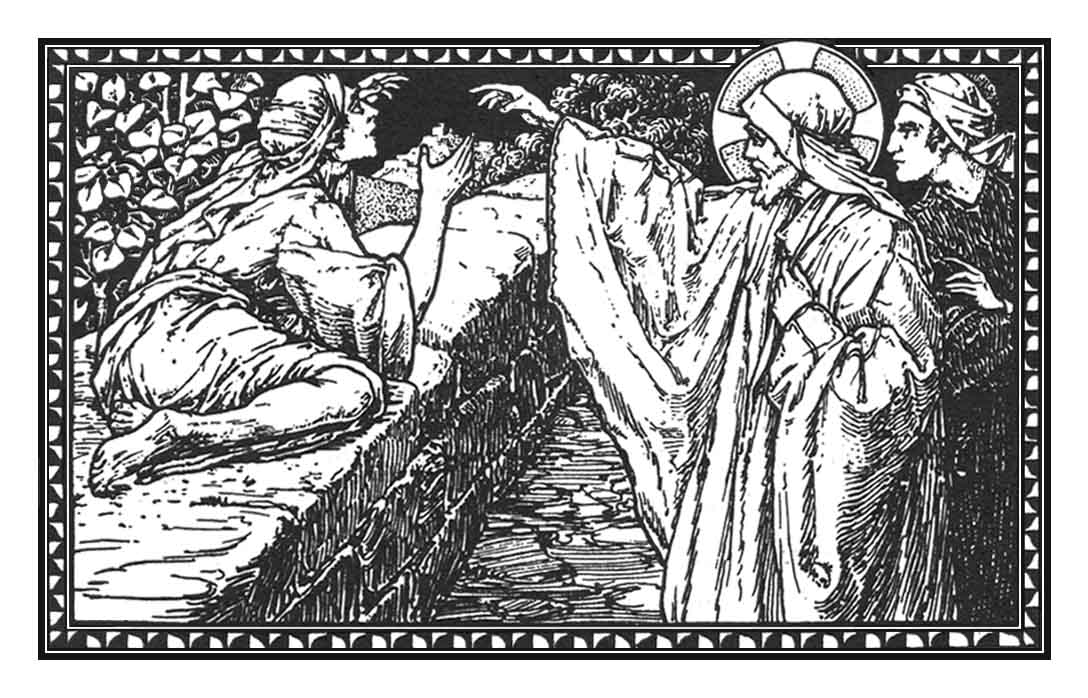This is the last preparatory Sunday before the start of Lent (on Ash Wednesday).
Fr. Goffine provides as with an important spiritual lesson on the Quinquagesima Sunday propers. Her also gives an instruction about the Lenten Season in preparation for the great feast of our redemption, Easter.
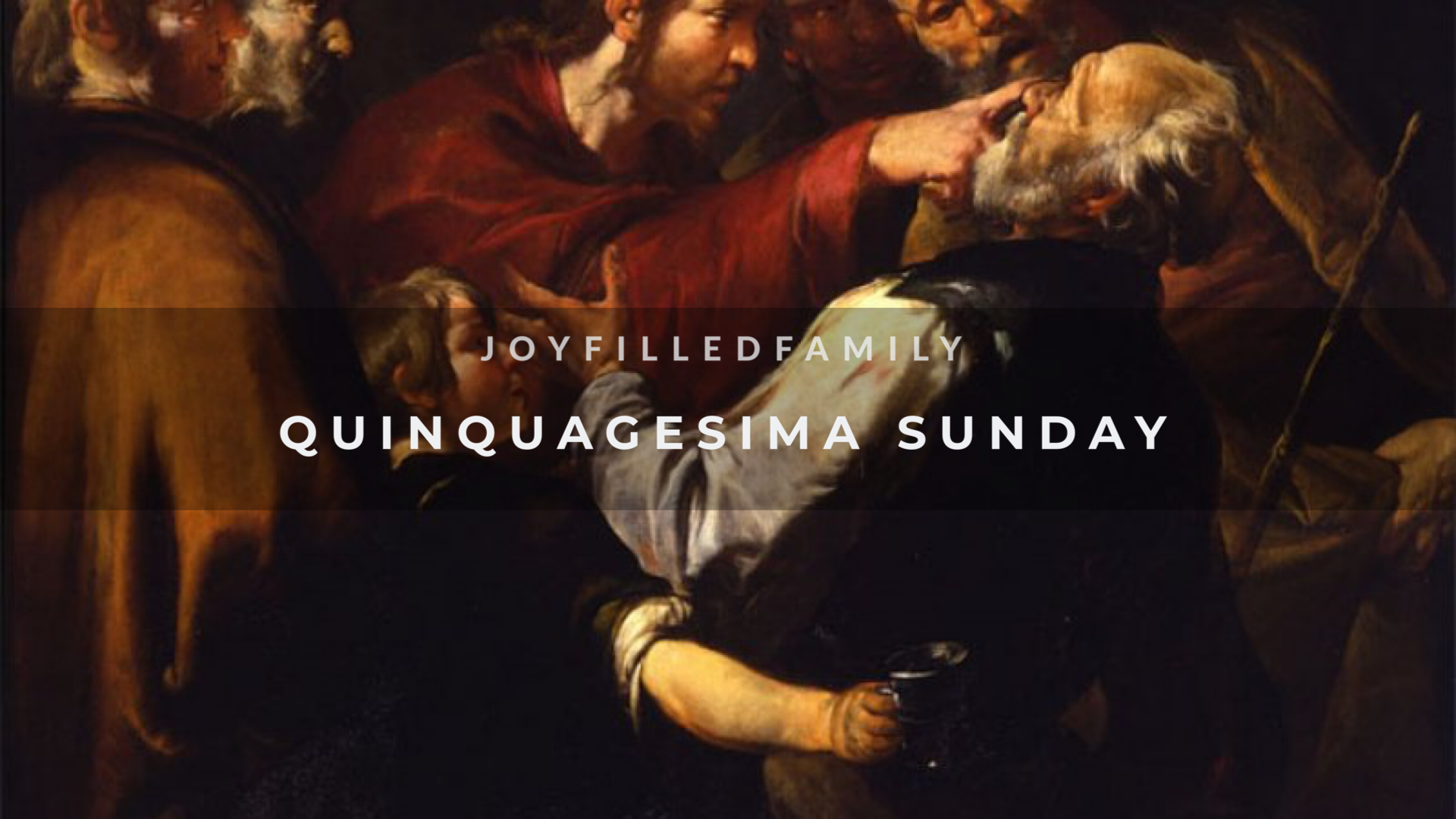
The Introit of this day’s Mass is the sigh of an afflicted soul confiding in God:
INTROIT Be thou unto me a God, a protector, and a place of refuge, to save me: for thou art my strength and my refuge: and for thy name’s sake thou wilt be my leader, and wilt nourish me. (Ps. 30:3, 4) In thee, O Lord, I have hoped, let me never be confounded: deliver me in thy justice, and set me free. (Ps. 30:2)
COLLECT O Lord, we beseech Thee, graciously hear our prayers, and unloosing the bonds of our sins, guard us from all adversity. Through our Lord, etc.
EPISTLE (I Cor. 13:1-13) Brethren, if I speak with the tongues of men and of angels, and have not charity, I am become as sounding brass or a tinkling cymbal. And if I should have prophecy, and know all mysteries and all knowledge, and if I should have all faith, so that I could remove mountains, and have not charity, I am nothing. And if I should distribute all my goods to feed the poor, and if I should deliver my body to be burned, and have not charity, it profiteth me nothing.
Charity is patient, is kind: charity envieth not; dealeth not perversely; is not puffed up; is not ambitious; seeketh not her own; is not provoked to anger; thinketh no evil; rejoiceth not in iniquity, but rejoiceth in the truth; beareth all things, believeth all things, hopeth all things, endureth all things. Charity never falleth away: whether prophecies shall be made void, or tongues shall cease, or knowledge shall be destroyed. For we know in part, and we prophesy in part: but when that which is perfect is come, that which is in part shall be done away.
When I was a child, I spoke as a child, I understood as a child, I thought as a child: but when I became a man, I put away the things of a child. We see now through a glass in a dark manner; but then face to face. Now I know in part; but then I shall know even as I am known. And now there remain faith, hope, charity, these three: but the greatest of these is charity.
EXPLANATION In this epistle St. Paul speaks of the necessity, the excellence and the nature of true charity. He says that all natural and supernatural gifts, all good works, even martyrdom, cannot save us if we have not charity; because love alone can render our works pleasing to God. Without charity, therefore, though ever so many prayers be recited, fasts observed, and good deeds performed, nothing will be acceptable to God, or merit eternal life. Strive then, O Christian soul, to lead a pious life in love, and to remain always in the state of grace.
Can faith alone, as the so-called Reformers assert, render man just and save him?
Faith alone, however strong, though it could move mountains, without love, that is, without good works performed for love of God and our neighbor, can never justify or save us. For, when St. Paul says, that man is justified by faith without works, (Rom. 3:28; 11:6; Eph. 2:8, 9) he means to refer to those works which were performed by command of the law of Moses, and which, as they were external and without true charity, were of no avail; he did not refer to those works which are performed in a state of grace with a lively, love-inspired faith.
Therefore the same Apostle writes to the Galatians: (Gal. 5:6) Faith only availeth which worketh by charity; to Titus: (Tit. 3:8) It is a faithful saying: and these things I will have thee affirm constantly: that they who believe in God, may be careful to excel in good works. These things are good and profitable unto men; and he exhorts the Colossians (Colos. 1:10) to be fruitful in every good work.
St. James confirms the same by saying: (James 2:17-24) So faith if it have not works, is dead in itself; by works man is justified and not by faith only. That this is the true doctrine of Christ is evident from His own words, when He says: “Every tree that bringeth not forth good fruit, shall be cut down and shall be cast into the fire.” (Matt. 7:19) At the day of judgment Christ will demand good works from all men, (Matt. 25:35) and will not judge them only according to their faith, but by their good works, which true faith must always produce. (Apoc. 20:12)
Would Christ and His apostles demand good works, if faith alone be sufficient? “The devil’s also believe and tremble,” (James 2:19) they believe, but they are not saved, and their faith but increases their torments. Therefore, the assertion that faith without good works is sufficient for justification and salvation, is plainly against the doctrine of Christ and His Church, and must of necessity lead man to vice and misery, as shown by the history of the unhappy separation of the sixteenth century.
Are good works available when performed in the state of mortal sin?
Good works performed while in a state of mortal sin avail nothing in regard to eternal life, writes St. Lawrence Justinian, but aid in moderating the punishment imposed for disobedience and the transgression of God’s commandments. They bring temporal goods, such as honor, long life, health, earthly happiness, etc.; they prevent us from falling deeper into sin, and prepare the heart for the reception of grace; so the pious person writes: “Do as much good as you can, even though in the state of mortal sin, that God may give light to your heart.”

ASPIRATION O God of love, pour the spirit of true charity into my heart that, according to the spirit of St. Paul, I may endeavor to be always in a state of grace; that all my works may be pleasing to Thee, and meritorious for me.
GOSPEL (Luke 18:31-43) At that time, Jesus took unto him the twelve, and said to them Behold, we go up to Jerusalem, and all things shall be accomplished which were written by the prophets concerning the Son of Man. For he shall be delivered to the Gentiles, and shall be mocked, and scourged, and spit upon; and after they have scourged him, they will put him to death; and the third day he shall rise again. And they understood none of these things, and this word was hid from them, and they understood not the things that were said.
Now it came to pass, when he drew nigh to Jericho, that a certain blind man sat by the wayside, begging. And when he heard the multitude passing by, he asked what this meant. And they told him that Jesus of Nazareth was passing by. And he cried out, saying: Jesus, Son of David, have mercy on me. And they that went before rebuked him, that he should hold his peace. But he cried out much more: Son of David, have mercy on me. And Jesus standing, commanded him to be brought unto him. And when he was come near, he asked him, saying: What wilt thou that I do to thee? But he said: Lord, that I may see. And Jesus said to him: Receive thy sight; thy faith hath made thee whole. And immediately he saw, and followed him, glorifying God: and all the people, when they saw it, gave praise to God.
Why did Christ so often foretell His passion to His disciples?
Because He wanted to show how great was His desire to suffer for us, for we speak often of that which we crave; and because He wished His disciples when they should see Him treated as a criminal and martyred, not to think evil of Him, or imagine themselves deceived, but remember that He had foretold all minutely that all happened of His own will.
Did not the disciples understand anything of what He predicted in regard to His future sufferings?
They may, certainly, have well understood He was to suffer, for which reason Peter tried to dissuade Him from it; (Matt. 16:22) but they did not comprehend why or for what He would suffer, or how He would rise again. All this the Holy Ghost gave them to understand, after it had come to pass. (John 14:26) The light of the Holy Ghost is of so much value, that without it even the clearest doctrines of faith are not understood.
Why does Christ so often call Himself the Son of Man?
He wished to show, in the Jewish way of speaking, He was also man, a descendant of Adam, and that we should be humble, and not seek or desire high titles.
Why did the blind man call Christ the Son of David?
Because, like all the Jews, he believed that the Messiah, according to humanity, would be of the house of David, as was promised. (Ps. 131:11)
Why did Christ ask the blind man: What wilt thou that I do to thee?
This He asked, not because He was unaware of the blind man’s wish, but to enable him the better to prove his faith and hope that through Christ he would receive his sight; and to teach us how willing He is to help us, and how it pleases Him if we confidingly place our wants before Him. We should learn from this blind man, who would not be restrained by the passing crowd in his ardent and reiterated request, not to pay attention, in the work we have commenced, to human respect, or human judgment, but to persevere, and not allow ourselves to be led astray by the world’s mockery or contempt. We should also learn to be grateful to God, and faithfully cling to Him, if He has once opened the eyes of our mind, and healed our spiritual blindness, which is far more deplorable than physical blindness, for nothing can be more miserable than not to see and understand God, not to know what is necessary for our salvation, and what is pernicious.
Why is this gospel read on this Sunday?
The Church wishes to remind us of the painful passion and death of Jesus, and to move us by the contemplation of those mysteries to avoid and despise the wicked, heathenish amusements of carnival, sinful pleasures which she has always condemned, because they come from dark paganism, and, to avert the people from them, commands that during the three days of carnival the Blessed Sacrament shall be exposed for public adoration, sermons given, and the faithful exhorted to have recourse at this time to the Sacraments of Penance and the Blessed Sacrament of the Altar, with the reception of which Pope Clement XIII. (Breve, June 23, 1765) connected a plenary indulgence. A true Catholic will conform to the desire of his holy Church, considering the words which St. Augustine spoke, at this time, to the faithful:
The heathens (as also the worldly people of our days) shout songs of love and merriment, but you should delight in the preaching of the word of God; they rush to the dramatic plays, but you should hasten to Church; they are intoxicated, but you should fast and be sober.”
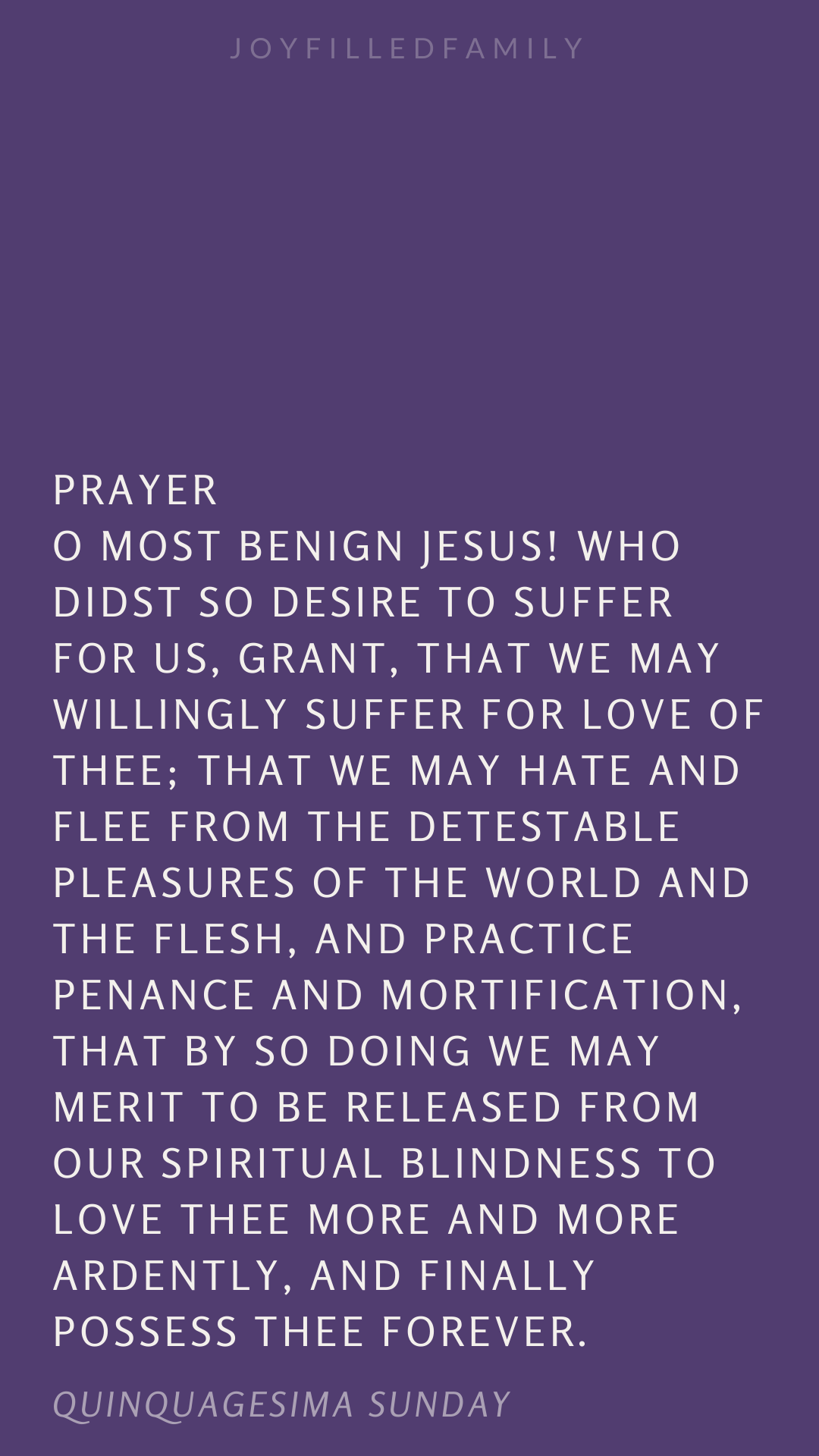
PRAYER O most benign Jesus! who didst so desire to suffer for us, grant, that we may willingly suffer for love of Thee; that we may hate and flee from the detestable pleasures of the world and the flesh, and practice penance and mortification, that by so doing we may merit to be released from our spiritual blindness to love Thee more and more ardently, and finally possess Thee forever.
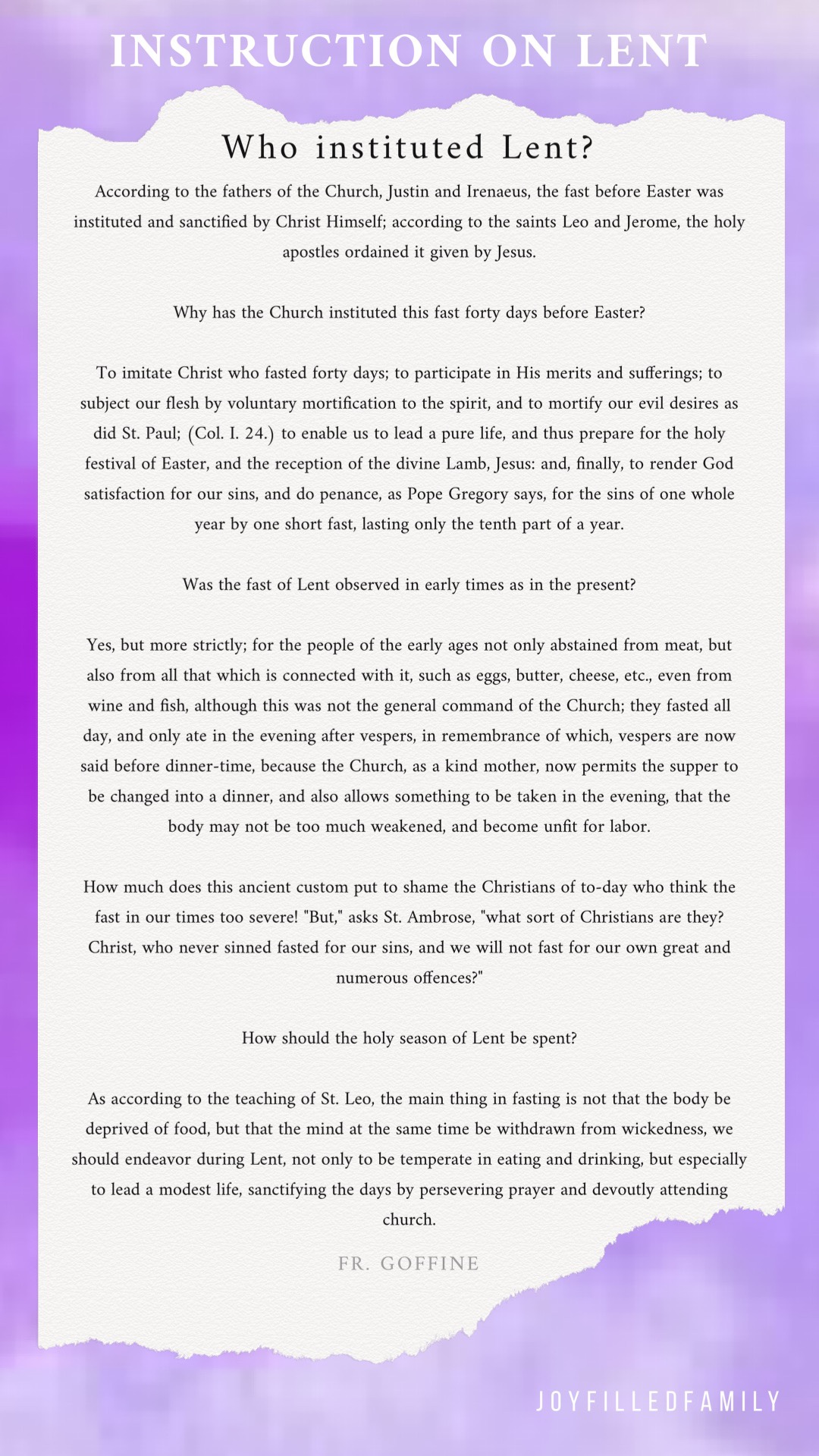
Instruction on Lent
Who instituted Lent?
According to the fathers of the Church, Justin and Irenaeus, the fast before Easter was instituted and sanctified by Christ Himself; according to the saints Leo and Jerome, the holy apostles ordained it given by Jesus.
Why has the Church instituted this fast forty days before Easter?
To imitate Christ who fasted forty days; to participate in His merits and sufferings; to subject our flesh by voluntary mortification to the spirit, and to mortify our evil desires as did St. Paul; (Col. 1:24) to enable us to lead a pure life, and thus prepare for the holy festival of Easter, and the reception of the divine Lamb, Jesus: and, finally, to render God satisfaction for our sins, and do penance, as Pope Gregory says, for the sins of one whole year by one short fast, lasting only the tenth part of a year.
Was the fast of Lent observed in early times as in the present?
Yes, but more strictly; for the people of the early ages not only abstained from meat, but also from all that which is connected with it, such as eggs, butter, cheese, etc., even from wine and fish, although this was not the general command of the Church; they fasted all day, and only ate in the evening after vespers, in remembrance of which, vespers are now said before dinner time, because the Church, as a kind mother, now permits the supper to be changed into a dinner, and also allows something to be taken in the evening, that the body may not be too much weakened, and become unfit for labor.
How much does this ancient custom put to shame the Christians of today who think the fast in our times too severe! “But,” asks St. Ambrose, “what sort of Christians are they? Christ, who never sinned fasted for our sins, and we will not fast for our own great and numerous offences?”
How should the holy season of Lent be spent?
As according to the teaching of St. Leo, the main thing in fasting is not that the body be deprived of food, but that the mind at the same time be withdrawn from wickedness, we should endeavor during Lent, not only to be temperate in eating and drinking, but especially to lead a modest life, sanctifying the days by persevering prayer and devoutly attending church.
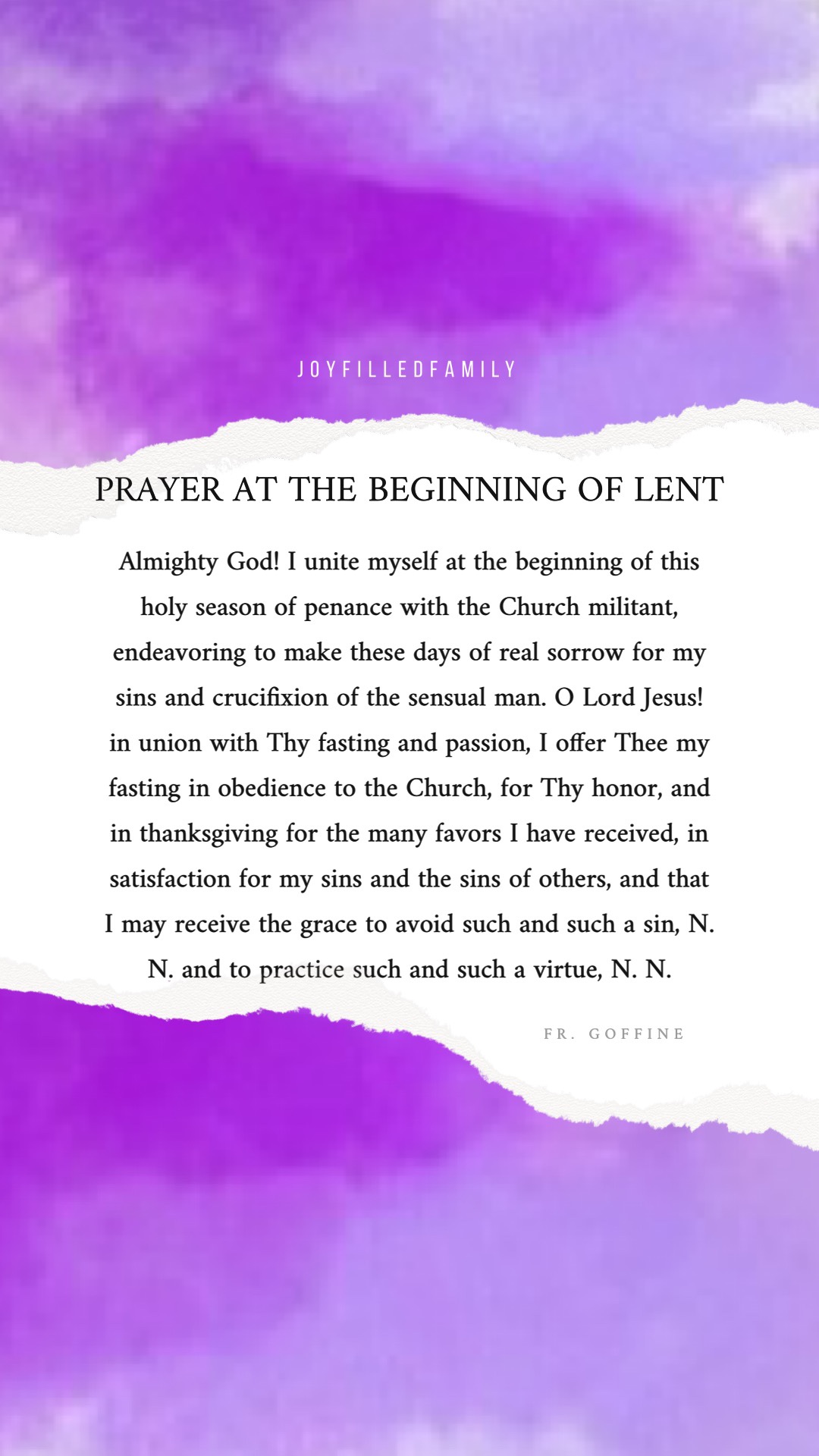
Prayer at the beginning of Lent
Almighty God! I unite myself at the beginning of this holy season of penance with the Church militant, endeavoring to make these days of real sorrow for my sins and crucifixion of the sensual man. O Lord Jesus! in union with Thy fasting and passion, I offer Thee my fasting in obedience to the Church, for Thy honor, and in thanksgiving for the many favors I have received, in satisfaction for my sins and the sins of others, and that I may receive the grace to avoid such and such a sin, N. N. and to practice such and such a virtue, N. N.
![[Quin.jpg]](https://joyfilledfamily.com/wp-content/uploads/2011/03/Quin-184x300.jpg)
 ng
ng kw
kw -j
-j s
s
